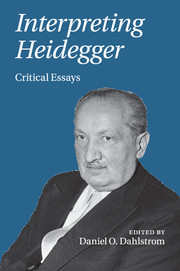Introduction
Published online by Cambridge University Press: 11 April 2011
Summary
Heidegger is known for the importance he places on interpretation. In his view we are creatures of interpretation. Every move we make is an interpretation: elaborating, exposing, and shaping our self-understanding and, in the process, our relationships to ourselves, our world, and other things within the world. At the same time, from the moment we find ourselves, as interpreting animals, thrown into this process, we find that our interpretations are not ours alone, but the often mindless yet time-tested iteration of a tradition of interpretations written into our most common practices and beliefs. If we create our lives through our interpretations, it is not without the inertia of traditional interpretations. We are both the parents and the progeny of interpretation and, in both these ways, interpretation constitutes our existence and any sense of being.
This centrality of interpretation is no less true for Heidegger when it comes to what, in his view, most urgently calls for thinking today. We need to think responsibly and creatively about what it means to us for things, including ourselves, to be and what grounds this meaning. The task of thinking is, in other words, thoughtful interpretation of the ground (not merely the cause) of our understanding of what it means to be. At the same time, given the historical character of our thinking, we can only think creatively and responsibly about these matters by considering how the history of such interpretations – philosophical as well as poetic – enables and disables that understanding.
- Type
- Chapter
- Information
- Interpreting HeideggerCritical Essays, pp. 1 - 12Publisher: Cambridge University PressPrint publication year: 2011

